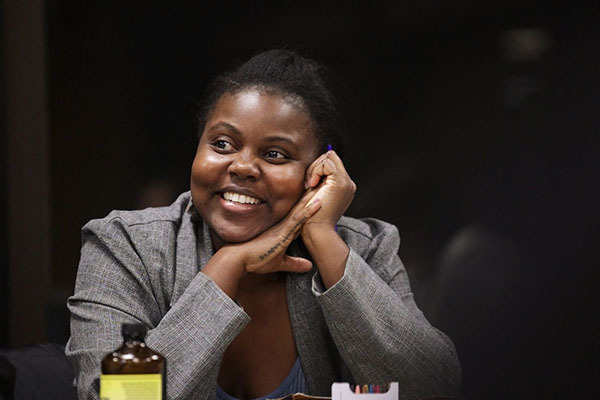Professional development

The graduate program in English prepares you for advanced humanistic and interpretive work in and beyond the academy. Whether you enroll in our Ph.D., MFA, or M.A. program, during your time here you will gain the knowledge and skills to be a successful researcher, writer, speaker, teacher, mentor, and colleague.
We have a dedicated job placement director, and we work closely with Graduate Career Services, as well as with the Kaneb Center for Teaching and Learning, to give you strong professionalization support throughout your time in the program.
From your very first semester you will be paired with a faculty advisor to discuss professional development (among other topics), and to help you discern the opportunities and experiences that can best serve your interests and aspirations.
Ph.D. professional development
The Ph.D. in English prepares you for a career in the academy while providing skills and knowledge relevant to many additional paths, including academic administration, publishing, business, and nonprofit work.
Your dissertation director and committee will play an active part in contributing to and supporting your professional development. Our program also offers three core professionalization practicums designed to help you develop familiarity with key professional genres and practices:
- Introduction to the Profession: a first-semester practicum that acquaints you with the forms through which academics present their work, the issues that arise from the institutional contexts of English studies, and the resources and habits involved in successful and original research in the field;
- Writing for the Profession: usually taken in spring of year 4 and designed to familiarize you with the steps involved in preparing a piece of research for publication, to become familiar with journals in your field, and to provide a supportive writing community;
- Preparation for the Profession: usually taken in fall of year 5 and designed to support you at every step of the journey to employment, especially in communicating your research and expertise to an audience quite possibly outside your field, or even outside the academy.
Our departmental area seminars (in Medieval, Early Modern, 18th- and 19th-Century British and Irish, 20th-Century British and Irish, and American literatures) meet regularly through the year and serve as lively and supportive venues in which you can workshop your dissertation chapters, conference papers, articles, and job talks, and also interact with visiting speakers.
Service and teaching opportunities
We take pride in assigning manageable service adapted to your interests and aspirations, and in keeping years 1 and 5 service-free to prioritize coursework and dissertation writing.
As a Ph.D. student you receive pedagogical training and a variety of opportunities to teach, from TAships and sections of Writing and Rhetoric to independently designed literature courses. Further teaching opportunities are available through our partnerships with academic units including Gender Studies, American Studies, the Department of Film, Television, and Theatre, and the Snite Museum of Art.
Those interested in editorial work can get an inside look at journal and book editing while working with publications supervised by department faculty. Journals currently edited in-house include Religion and Literature, Spenser Studies, and Studies in the Age of Chaucer. Service opportunities also include research assistantships, in which you might work closely with a faculty member on a particular project such as a forthcoming book.
Strong publication record
Ph.D. students in English have an extraordinary record of publication in their fields of study. Recent work appears (or is forthcoming) in top journals including English Literary History, Exemplaria, Journal of Victorian Culture, Textual Practice, American Literature, Modern Drama, Meridians, postmedieval, European Romantic Review, James Joyce Quarterly, Contemporary Literature, ESQ: A Journal of Nineteenth-Century American Literature and Culture, English Literary Renaissance, Arizona Quarterly, Yearbook of Langland Studies, and many more.
Students are also active contributors to public conversations about research in the humanities, including through public-facing publications such as Post45 and Public Seminar.

“The push to publish feels more pressing in the field every year, but the program provided support for us by way of the writing practicums. The classes provided us with time, space, and guidance every week to write and workshop which was invaluable to my process for submitting articles for publication. The public writing practicum in particular allowed me to read, understand, and practice public writing in my own specialized field with support from both my peers and my instructor."
Guaranteed sixth-year postdoctoral fellowship
Students who complete the degree in five years are guaranteed a College of Arts and Letters 5+1 Postdoctoral Fellowship. This one-year fellowship includes salary, funds for professional development, and benefits, and is designed to strengthen your career opportunities in and beyond the academy.
MFA in Creative Writing professional development
Professional development is deeply integrated into the creative writing MFA, which is a terminal degree.
Our program is focused both on nurturing and supporting our students in the development of their writing, and in training our students for professional lives in literary fields, including teaching, publishing, editing, arts administration, publicity, and – of course – writing.
We offer numerous opportunities for professional development and training, including:
- First-year pedagogy practicum
- First-year publishing practicum
-
First-year fellowships: All of our students fulfill first-year fellowship duties in publicity, organizing, outreach, editing, research, and other tasks. Positions include:
- Media Fellow
- Campus Coordinator
- Sparks Editorial Fellow (Notre Dame Review)
- Action Books Editorial Fellow
- Community Outreach Coordinator
- Research Assistant
- Second-year teaching: All of our students are expected to teach their own writing courses in their second year. Students typically teach Introduction to Creative Writing, Introduction to Fiction, or Introduction to Poetry. The first-year pedagogy practicum is a prerequisite for teaching.
- Sparks Editorial Internship: We offer two summer editorial internships with major publishers in New York.
- Research and Travel Funding: The program is able to offer modest research and travel funding. More funding is available through the Graduate School.
- AWP: We fund our students' membership in the annual AWP creative writing conference, and also offer our students the opportunity to staff the Notre Dame Creative Writing MFA/Action Books table.
- Readings, Master Classes, and Other Events: Our program features numerous readings, master classes, and other literary events throughout the year, giving students the opportunity to meet and interact with literary professionals. We also coordinate closely with other organizations on campus doing the same work, including the Initiative on Race and Resilience, Letras Latinas, the Notre Dame Institute for Advanced Studies, Browning Cinema, and others.
M.A. professional development
As an M.A. student in English you will participate in the “Introduction to the Profession” practicum in your first semester and be eligible to participate in a fuller range of professionalization practicums and workshops offered by the program and University. One-on-one conversations with your faculty advisor and with the director of graduate studies will provide further opportunities to address your interests and aspirations, while Graduate Career Services offers outstanding support and networking opportunities for a range of career paths.